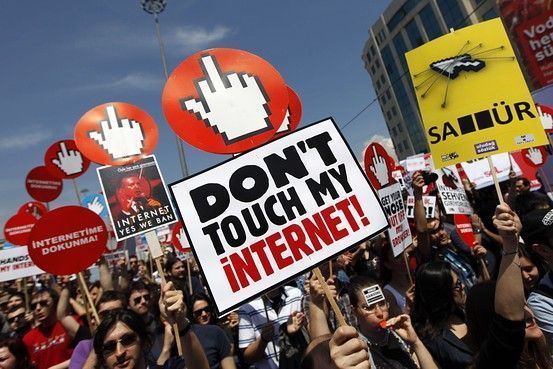*Genius*
Prime VIP
A new Turkish legislation, called “Procedures and Principles Regarding the Safe Use of the Internet”, is scheduled to be enforced in three months. The law would require netizens to choose from 4 censoring options: standard, domestic, family, and kids. Meanwhile, those who would choose to circumvent any of those filters would be considered lawbreakers. The suggestion becomes even more ridiculous when it offers to ban the use of the following key words in domain names: “girl,” “partner,” and “animal”.

The Turkish all over the country were outside in the streets recently, protesting government plans to enforce obligatory filters on the web. The new law is scheduled at the end of August. The software programmers claim that the filters it suggests are going to turn the web into a state-controlled area, because people would enter a channel leading them to the server of the state, distributing the bandwidth to all the users. In other words, the proposed system enables the control of the people, just telephone tapping. The most ludicrous part of the legislation bans the use of key words in domain names, including “blonde,” “sister-in-law,” and “partner”.
In response, Tayfun Acarer, the President if Information Technologies and Communications Authority, defended the legislation as a reasonable response to requests from online users. In addition, he claimed that the proposed system would change nothing for ordinary Internet consumers. Tayfun Acarer explained that the legislation was developed after negotiating with most of the country’s ISPs, and even after it is enforced, any user who wants the current profile would keep using it, but those asking for filters would be able to use the “Secure Internet Profile”.
The only problem is that the law developers didn’t reveal what exactly even the standard profile would be filtering. Thus, people fear that the Information Technologies and Communications Authority will have the exclusive right to choose what websites would be filtered, leaving the public opinion aside.
Industry observers also criticized the fact that the legislation wasn’t even voted on, and compared Turkey to Australia, where the country’s communications authority has also been pushing obligatory Internet filters. Now the Turkish, just like the Australians, are also unable to have their voices heard.

The Turkish all over the country were outside in the streets recently, protesting government plans to enforce obligatory filters on the web. The new law is scheduled at the end of August. The software programmers claim that the filters it suggests are going to turn the web into a state-controlled area, because people would enter a channel leading them to the server of the state, distributing the bandwidth to all the users. In other words, the proposed system enables the control of the people, just telephone tapping. The most ludicrous part of the legislation bans the use of key words in domain names, including “blonde,” “sister-in-law,” and “partner”.
In response, Tayfun Acarer, the President if Information Technologies and Communications Authority, defended the legislation as a reasonable response to requests from online users. In addition, he claimed that the proposed system would change nothing for ordinary Internet consumers. Tayfun Acarer explained that the legislation was developed after negotiating with most of the country’s ISPs, and even after it is enforced, any user who wants the current profile would keep using it, but those asking for filters would be able to use the “Secure Internet Profile”.
The only problem is that the law developers didn’t reveal what exactly even the standard profile would be filtering. Thus, people fear that the Information Technologies and Communications Authority will have the exclusive right to choose what websites would be filtered, leaving the public opinion aside.
Industry observers also criticized the fact that the legislation wasn’t even voted on, and compared Turkey to Australia, where the country’s communications authority has also been pushing obligatory Internet filters. Now the Turkish, just like the Australians, are also unable to have their voices heard.
